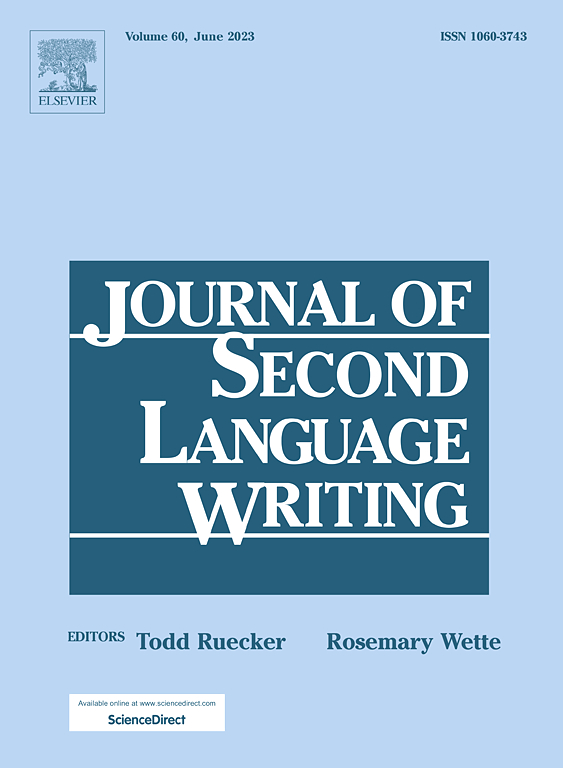University students’ engagement with generative AI-supported automated writing evaluation (AWE) feedback
IF 4.5
1区 文学
Q1 LINGUISTICS
引用次数: 0
Abstract
Studies have shown that engagement with automated writing evaluation (AWE) feedback can have a positive impact on writing development. With the emergence of generative AI (GAI), there is potential to improve AWE feedback and its reception by writers, calling for research on how writers work with GAI-supported AWE feedback. This study therefore aims to examine students’ behavioural, cognitive and affective engagement with such feedback through a GAI-powered AWE platform, Learnalytics. A qualitative, multiple-case study approach was adopted. Four undergraduate engineering students with diverse backgrounds and varying levels of writing proficiency at a university in Hong Kong were invited to use Learnalytics to complete and revise their drafts of a research report for capstone project courses. Data were collected through student drafts, computer screen recordings, stimulated recall sessions and semi-structured interviews, and were analysed qualitatively. Findings reveal how forms and levels of engagement were mediated by individual differences and various aspects of participants’ writing process, experience and considerations. This study contributes to the growing body of research into the intersection of GAI and L2 writing. (174 words)
大学生参与生成人工智能支持的自动写作评估(AWE)反馈
研究表明,参与自动写作评估(AWE)反馈可以对写作发展产生积极影响。随着生成式人工智能(GAI)的出现,有可能改善AWE反馈以及作者对其的接受程度,因此需要研究作者如何使用AI支持的AWE反馈。因此,本研究旨在通过ai驱动的AWE平台Learnalytics,研究学生的行为、认知和情感参与。采用了定性的多案例研究方法。香港一所大学的四名背景各异、写作水平各异的工科本科生被邀请使用Learnalytics来完成和修改他们的研究报告草稿,该报告将用于顶点项目课程。研究人员通过学生草稿、电脑屏幕录音、刺激回忆环节和半结构化访谈等方式收集数据,并对数据进行定性分析。研究结果揭示了参与的形式和水平如何受到个体差异和参与者写作过程、经验和考虑的各个方面的影响。这项研究为GAI和第二语言写作的交叉研究做出了贡献。(174字)
本文章由计算机程序翻译,如有差异,请以英文原文为准。
求助全文
约1分钟内获得全文
求助全文
来源期刊

Journal of Second Language Writing
LINGUISTICS-
CiteScore
8.80
自引率
13.10%
发文量
50
审稿时长
59 days
期刊介绍:
The Journal of Second Language Writing is devoted to publishing theoretically grounded reports of research and discussions that represent a significant contribution to current understandings of central issues in second and foreign language writing and writing instruction. Some areas of interest are personal characteristics and attitudes of L2 writers, L2 writers'' composing processes, features of L2 writers'' texts, readers'' responses to L2 writing, assessment/evaluation of L2 writing, contexts (cultural, social, political, institutional) for L2 writing, and any other topic clearly relevant to L2 writing theory, research, or instruction.
 求助内容:
求助内容: 应助结果提醒方式:
应助结果提醒方式:


